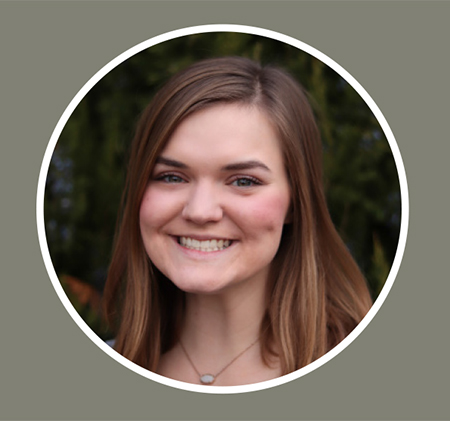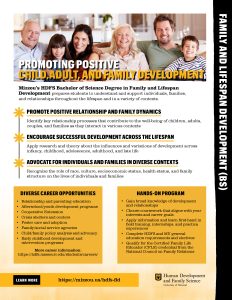The Family & Lifespan Development emphasis area prepares students to understand and support individuals, families, and relationships throughout the lifespan and in a variety of contexts. Students can work with their academic advisor to choose courses that fit their specific interests within the degree program requirements. Our graduates will:
PROMOTE POSITIVE RELATIONSHIP AND FAMILY DYNAMICS
Identify key relationship processes that contribute to the well-being of of children, adults, couples, and families as they interact in various contexts
ENCOURAGE SUCCESSFUL DEVELOPMENT ACROSS THE LIFESPAN
Apply research and theory about the influences and variations of development across infancy, childhood, adolescence, adulthood, and late life
ADVOCATE FOR INDIVIDUALS AND FAMILIES IN DIVERSE CONTEXTS
Recognize the role that cultural, structural, and socioeconomic factors, as well as variations in family structure, gender, health, and more, play in lives of individuals, relationships, and families
Build your skills in a practical, hands-on way
- Combine understanding and application of research and theory to gain broad knowledge of development and relationships across the lifespan
- Choose among many HDFS elective courses to align with your interests and professional goals
- Build experiential learning through practical experiences at the on-campus MU Child Development Lab or through field training and internships in a variety of community settings of your choosing
- Collaborate with faculty and contribute to hands-on research to answer important questions about early childhood development and learning, youth and adult development, family relationships and interactions, intimate relationship formation and maintenance, the influence of health, and the experiences of diverse youth and families
- Graduates may qualify for the Certified Family Life Educator (CFLE) credential from the National Council on Family Relations
General Education Requirements
Degree Requirements and Sample Program
Graduates from FLD are prepared to work with children, adults, families, and communities in a variety of roles and settings. Supporting the positive development of individuals and families is an essential part of everyday life.
- Early childhood development and intervention programs
- Relationship and parenting education
- Afterschool/youth development programs
- Cooperative Extension
- Military youth and family services
- Crisis shelters and centers
- Foster care and adoption
- Older adult support programs
- Family/social service agencies
- Child/family policy analysis and advocacy
- Refugee and immigrant support programs
For more career information, visit the National Council on Family Relations and the National Association for the Education of Young Children.
 “Adoption and foster care is often stressful and unpredictable, and I frequently use what I learned as an HDFS student about how everyone is shaped by their own experiences to help families cope with the changes.”
“Adoption and foster care is often stressful and unpredictable, and I frequently use what I learned as an HDFS student about how everyone is shaped by their own experiences to help families cope with the changes.”
ALLIE FREESE | KANSAS CITY, MO
FAMILY & LIFESPAN DEVELOPMENT (BS) ‘18

HDFS Academic Advisors:
For interest in early childhood/child development, contact:
 Dr. Michelle Mathews
Dr. Michelle Mathews
Phone: (573) 882-3999
E-mail: mathewsm@missouri.edu
For interest in youth/adult development and family/ interpersonal relationships, contact:
 Kelly Warzinik
Kelly Warzinik
Phone: (573) 882-3521
E-mail: warzinikk@missouri.edu
